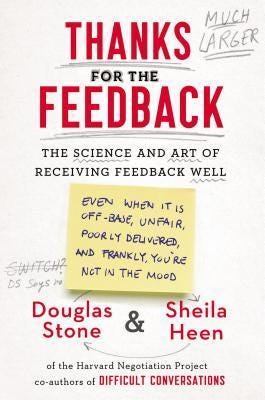Tuesday Dispatch: #117 - On Feedback
What's hard about feedback, and why is it such a complex topic?
People often say they don't get enough feedback. They really mean that they're unsure if anyone sees their hard work or values their input. They're expressing a feeling of not being appreciated.
Throughout my career, I've witnessed various methods of sharing feedback. I've also had countless discussions about feedback and its effects. Still, people often struggle to give feedback. Getting proper feedback is even more challenging.
What's hard about feedback, and why is it such a complex topic?
Let's get to it!
What is feedback?
I've come across many definitions of feedback. But the most impactful one I've found is this, and I've adhered to it ever since:
Helpful information, shared from a valued perspective, about past actions or behaviors intended to adjust and improve future actions and behaviors.
Let's break it down to understand why this is so good:
"helpful information": The information is useful. This is an excellent beginning. Feedback isn't about emotions or data. It's about information. This information encompasses both data and emotions. Moreover, it must be useful so the person giving feedback aims to assist. Their goal isn't to persuade, win a debate, control, or guide. It's to help!
"shared from a valued perspective": The person giving feedback should hold a respected viewpoint. They must be knowledgeable and possess the right character to make their feedback valuable. Different people sharing the same feedback convey a different message.
"about past actions or behaviors": Feedback focuses on actions and behaviors, not on the individual. We concentrate on what is done, not on the state of being or who's doing it.
"intended to adjust and improve future actions and behaviors.": Effective feedback changes people's future behavior. It's not about proving you're right, scolding people, or judging. It's all about modifying actions.
How do you deliver effective feedback?
Situation Behavior Impact - A powerful feedback framework
We frequently make up stories in our minds about others, particularly when they let us down. This is a common occurrence. We observe actions and think we understand why someone behaved in a specific manner. Then, we respond based on those assumptions.
Ask the person if you want to know their intentions. If you want them to understand their impact, tell them. But, these crucial talks seldom occur. So, we spend our days tangled in misunderstandings and actions rooted in wrong assumptions.
The method of Situation-Behavior-Impact is easy to understand: You identify the Situation clearly, outline the observed Behaviors in detail, and convey how the person's behavior affected you.
The Feedback Equation by Lara Hogan
Many people fear awkward conversations. This fear makes us avoid asking for feedback. Sometimes, feedback can be painful. Often, others give us vague, general feedback.
The feedback equation begins with you noting someone's actions. This involves the facts - Who, What, When, and Where. You can capture these observations using a video camera. It does not involve your feelings towards someone's actions.
Next, describe the behavior's impact. Here, you can express your feelings!
Finish it up with either a question for them or a request to behave differently.
Don't miss the full explanation of this framework.
Additional Resources
“Thanks for the Feedback” by Douglas Stone and Sheila Heen
This book is ideal if you aim to enhance your ability to give feedback. I gained more knowledge about feedback from this book than a hundred other resources. It's excellent, and I strongly endorse it.
You'll find out that the word "feedback" came about in the 1860s. It was born during the Industrial Revolution. It means how energy, momentum, or signals return to where they started in a machine system.
Feedback is vital in today's work environment. It helps to grow talent. It boosts morale. It brings teams into alignment. It solves problems. It also increases profits.
The Pocket Guide to the Polyvagal Theory
Why can feedback be so hard to hear, listen to, understand, remember, and leverage?
The Polyvagal Theory, a book released in 2011, answers this question greatly.
This work by Stephen Porges offered a deep insight into the autonomic nervous system. It catered to a clinical audience eager to understand conditions like trauma, anxiety, depression, and other mental health issues.
The book simplified the polyvagal perspective for clinicians and other professionals. It provided new ideas and insights for interpreting human behavior. The viewpoint emphasized the important link between mental experiences and their physical manifestations in the body. Despite its groundbreaking content, some found the book challenging to read.
This book is a must-read if you want to step up your game as a leader and understand how your body reacts to stress, danger, and safety.
Wrapping up
Proper feedback changes the way people behave and operate in any organization. That’s why it’s so important to get it right.
Our training program, "The Leadership Dojo," uses role-plays and workshops to practice sharing feedback. We aim to understand all the subtle aspects of giving effective feedback. This way, people feel comfortable using these practices in their organizations.
Speaking of workshops, I still have a few vacant seats on my “Get to know your team” workshop on Maven.com. It’s great training for first-time managers who want to establish a culture of trust within their organization.
Check it out, and don’t miss your opportunity to become a team lead that everyone appreciates!





